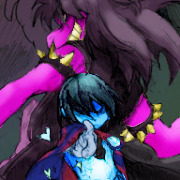|
I was digging through my giant tupperware bin of old RPG stuff in my basement and I have to say that my old Planescape stuff doesn't hold up as being useful RPG material. Part of it is that being handcuffed to the dumb as hell AD&D Great Wheel cosmology, but the prose and organization definitely reeks of the "I want to be writing novels, but I'm getting paid this instead" that abounded in the 90s. DiTerlizzi's art is still sweet as heck though. edit: also, ugh at all the slang
|
|
|
|

|
| # ? May 24, 2024 23:24 |
|
I was discussing the new Twin Peaks with a friend and I mentioned that there was a RPG heavily inspired by it, Heaven & Earth, but that it kinda falls flat because it doesn't encode the themes or atmosphere it wants in any meaningful way. Emulating a particular artist's style is probably too much to ask from any set of rules, but is it possible to to build surrealism into a game? People often describe Fiasco as the Coen Bros. RPG, and Apocalypse World is well set up to emulate the style of an ensemble drama where the characters are archetypal and share the spotlight as they develop. But surrealism, magical realism, dream logic, and psychological horror...I can't even begin to think about how I would do that in a game in a way that doesn't depend entirely on my GMing style, ability to build trust with the players, and managing everything very delicately so that they don't feel like they're floundering in a world where nothing makes sense and their actions are meaningless. My wife opined that Lynch's work is "fantasy" in the same sense that Dali and Magritte depict fantasy worlds, and that the typical nerd approach of trying to figure out the mechanics of how the magic works is worse than useless. Halloween Jack fucked around with this message at 18:42 on Sep 6, 2018 |
|
|
|
Unknown Armies with super low end powers is my first instinct
|
|
|
|
Don't use games for things that aren't expressed well through mechanics.
|
|
|
|
Pollyanna posted:What is an entry level RPG? https://www.dmsguild.com/m/product/175358
|
|
|
|
whydirt posted:edit: also, ugh at all the slang The slang owns and is a big part of what makes Sigil feel like such an evocative setting, but it does require people putting the work in to actually use it.
|
|
|
|
Pollyanna posted:What is an entry level RPG? Any version of D&D or any direct D&D knock-off with minimal narrative elements (no pbta or FATE games). Yes, even 3rd edition. These are the important things for introducing completely new players: *play to expectations. If a player comes in having listened to an AP podcast/video or something similar they're going to have vague, surface-level ideas of what the game is and minimal knowledge beyond that. If they come to you and say "I want to play a wizard" the answer should be "here is a class called wizard. It does all the things you've seen a wizard do before" not "first you take a high concept like "I'm a wizard" and then each stunt...". Class based systems are really approachable and especially if they're focusing archetypes the player already has some vague idea of. *Avoid narrative elements. New players are just getting used to the idea of the player/character dichotomy and it's one of the biggest hurdles in moving from "basically a boardgame" to "actually roleplaying". Asking them to also deal with a third layer of meta-narrative is going to overload them. Something basic like action points and such are easy enough but anything remotely resembling FATE compels or concessions is going to be too much. *defined rules: When a player asks how to do X, your answer should be "roll X and add/subtract Y". If the game involves a bunch of conditional decisions or multiple approaches to the same problem it's a bad idea. *Simple rewards and motivations: This is more about setting but D&D lends itself easily to a very simple reward structure. Go to the place, fight the things, get the treasure. You can literally start players in the door of a dungeon and tell them they were hired to go in and kill the goblin king and that's all the setup you need.
|
|
|
|
The board game thread just had a discussion on how the very idea of "entry games" is both misguided and a bit insulting to players, and I really agree with that idea for ttrpgs too. People will learn whatever looks coolest to them, no rpg is really hard or easy unless you're like, considering a certain reading level for children. If someone thinks that dungeon crawling with minis and being Big drat Heroes sounds cool they're going to pick up D&D really fast because it interests them, and they might bounce off a storygame that has fewer rules (and thus seems simpler) because it just isn't as immediately appealing and gripping to their sensibilities. Similarly if they love the idea of teen drama they probably are going to immediately take to Monsterhearts, even if they're a bit shy or uncomfortable with improv. Now there are a dozen things that someone might find cool or exciting about any given game, maybe it's a mechanic that sounds fun to explore, or maybe they love the art direction in the book, but that spark is ultimately what's important for getting over the rules hurdles.
|
|
|
|
Thatís why Iím always very clear about what kind of game Iím interested in running, cause not everyone likes rules-light or PbtA games. In fact, the group at work grew out of a boardgames group, so theyíre extra unrelated to narrative. Maybe all games should start out narratively light and unassuming at first, and only get detailed if people are still playing? oriongates posted:*defined rules: When a player asks how to do X, your answer should be "roll X and add/subtract Y". If the game involves a bunch of conditional decisions or multiple approaches to the same problem it's a bad idea. Why not just play a video game at this point?
|
|
|
|
By all means, tell me all about the thriving and widespread genre of video games that are suited for 3-5 players (not just one, and not MMOs designed for dozens or hundreds), has robust content-generation and game management tools, has code simple enough and exposed enough that I can fix balance or functionality problems myself if I have to, and has gameplay similar to one of the better standby high-crunch TRPGs. I am only mostly being sarcastic.
|
|
|
|
gloomhaven....on tabletop simulator I do think that it's a little daft to design a heavy-crunch grid-based system and not provide a reference implementation - if your system is so well-defined that it could be coded up, it should be. I think most tactics games work fine for 3-5 players (spoilers - you hand the controller to the next guy after your turn) so really it's the game management/content adding part that's hard. "GM" mode for divinity 2 might be the closest thing but I don't love the system. (I can see it now...."Okay philip, you control the one named Ramza, and I know that that looks like a chocobo, but it's a goblin") Jeffrey of YOSPOS fucked around with this message at 19:36 on Sep 6, 2018 |
|
|
|
a good entry table top game is whatever the gm wants to run and understands enough to help new players get
|
|
|
|
Pollyanna posted:Thatís why Iím always very clear about what kind of game Iím interested in running, cause not everyone likes rules-light or PbtA games. In fact, the group at work grew out of a boardgames group, so theyíre extra unrelated to narrative. You can't make that clear to new players, because they don't know what any of this means. quote:Maybe all games should start out narratively light and unassuming at first, and only get detailed if people are still playing? Or switch to different games as time goes on. More games are better, but let people try things out in the shallow end before you throw them off the diving board. Also, this assumes that narrative is the natural evolution of gaming, that's not what everyone wants. The goal is to introduce people to RPGs as a concept, as a pastime, not to mold them into whatever your idealized playstyle is. quote:Why not just play a video game at this point? Seriously? So let me add another caveat to that previous list "don't get judgy about how other people have fun".
|
|
|
|
I mean, I fuckin love video games, I just think theyíre a lot better at handling crunch than TRPGs minus the admittedly missing content/flexibility issue. Iíd rather play Disgaea on Switch than on tabletop.oriongates posted:Or switch to different games as time goes on. More games are better, but let people try things out in the shallow end before you throw them off the diving board. Iím not likely to have a chance to switch games cause Iím not likely to continue gaming with these people as time goes on is the thing, since itís by nature a kind of pick-up drop in and out setup. Itís not a set group of friends so much as coworkers in a slack channel. Itíd be a lot easier if I had a local group of close friends that were interested in playing, but I donít, so  And I do get that narrative isnít the platonic form of RPGs, donít worry. Itís just that RPGs are your best option for narrative stuff, so why not take advantage of that?
|
|
|
|
Pollyanna posted:
For me it comes dowm to these points: - Multiplayer, co-op versus 1 games are uncommon and don't handle 6 players well. - even in games like this, character customization is rare and not very deep, retheming is almost non existant. - social face to face is different that online. - physical handouts are cool
|
|
|
|
Pollyanna posted:I mean, I fuckin love video games, I just think theyíre a lot better at handling crunch than TRPGs minus the admittedly missing content/flexibility issue. Iíd rather play Disgaea on Switch than on tabletop. Yes, if you're crunching eleventy billion damage attack calculations, a computer will do that. If you want to do anything that hasn't been explicitly programmed, you're poo poo out of luck. Here's the secret: crunch is not actually that hard. Other than bizarro games that involve nested tables or calculus to determine your stats, none of the math in RPGs is demanding enough that you need a computer to take over for you. The purpose of a crunchy system is to answer questions for you. What happens if I'm blinded (you suffer -2 to X roll and can't make ranged attacks)? What happens if I'm on fire (1d6 damage a round, saving throw to end)? What happens if I want to jump over this thing on the way to the other thing (make an athletics roll)? How do I represent the fact that I'm really good at hitting people with axes (take the weapon specialization feat)? Experienced players/GMs don't need the system to do this for them. Even if they came across a crunchy system that didn't have an answer they could probably cobble one together. But for newbies having pre-existing rules and systems in place like this not only makes it easier for them to learn, it makes things feel less arbitrary, turns them into simple "if-then" situations rather than weird negotiations where the GM is offering you some kind of points which are presumably useful if you allow your character to fall face first into the mud which will do something you may also be a little unclear on. This is why rules-light games appeal to more experienced players, because there are less rules there's less "in the way" of you getting the system to do what you want. If you want 3rd edition D&D to be like an crazy high-powered anime then you've got to make all sorts of little adjustments to the rules on movement and range, bring in weird exotic classes, etc. If you want FATE to be more anime you just...describe it that way (and offer FATE points in ways that support those genre conventions). This leads to the assumption that rules-light games are simpler, but that's a misunderstanding. The rules are not the challenging part of an RPG (again, outside of the most bizarre and poorly designed), it's the concepts and rules-light games are even more conceptually intense because they are almost always also narrative games (although the two aren't synonymous) and narrative games demand a lot from their players. Especially demanding someone who's never tossed a dice before get into their character's head or improv...that's just not happening in most cases. While there are some players who are naturals and pick up even the highest of high-concept RPGs in a snap, most new players need a more curated experience. And yes, it should actually be a bit like a video game...video games are a lot of fun and finding out that you can have the same sort of fun with a lot more control, with a customized storyline and a truly open world is a great way to get people hooked on the hobby. quote:And I do get that narrative isnít the platonic form of RPGs, donít worry. Itís just that RPGs are your best option for narrative stuff, so why not take advantage of that? Because this is not a thing people are looking for when they join the hobby. New players are not thinking "I want to experience a multi-layered immersive narrative that plays to genre conventions while giving me control of the player and their world" they are thinking "oh, it's a game where you throw fireballs at a dragon. That looks neat, I wonder what that's like." Senior players have had the opportunity to get into roleplaying, they've had rewarding experiences with it and want more. They've probably looked at movies, TV shows and books and thought "how can I make a game that's like this?". Narrative games provide that opportunity, but you've got to have the desire to explore it first and new players are not going to have that (outside of the edge cases...obviously if you're recruiting from your local improv workshop things may be very different).
|
|
|
|
whydirt posted:I was digging through my giant tupperware bin of old RPG stuff in my basement and I have to say that my old Planescape stuff doesn't hold up as being useful RPG material. Part of it is that being handcuffed to the dumb as hell AD&D Great Wheel cosmology, but the prose and organization definitely reeks of the "I want to be writing novels, but I'm getting paid this instead" that abounded in the 90s. If you think the slang in Planescape is drek you clearly haven't grokked the glossary in 1e Shadowrun, chummer.
|
|
|
|
fool_of_sound posted:Unknown Armies with super low end powers is my first instinct
|
|
|
Halloween Jack posted:Well, my question is not really "What system should I use for these properties" but "can you even build a system around these themes." Games are all about structure, while one of the ideas behind surrealism is a lack of structure. I donít think itíd be impossible to tackle surrealist themes in a game, it would definitely be one that expects a lot from the players and the GM to confound structure in their choices and narrative.
|
|
|
|
|
Halloween Jack posted:Well, my question is not really "What system should I use for these properties" but "can you even build a system around these themes."
|
|
|
|
oriongates posted:Yes, if you're crunching eleventy billion damage attack calculations, a computer will do that. If you want to do anything that hasn't been explicitly programmed, you're poo poo out of luck. Thanks, that helps explain things a lot. I guess I should ask players what kind of game they want to play first, and if itís a good match I can try and GM it. I guess I donít really know where I would start with newbies. I started with Dungeon World, maybe my experience is really warped. Probably just 5E works, thatís what people seem to want to play (other than 3.PF). Pollyanna fucked around with this message at 21:31 on Sep 6, 2018 |
|
|
|
I'd say a good entry level RPG would be something with a medium amount of crunch, which is probably why BX/BECMI/RC D&D is still pretty popular
|
|
|
|
drrockso20 posted:I'd say a good entry level RPG would be something with a medium amount of crunch, which is probably why BX/BECMI/RC D&D is still pretty popular It is????? I would have expected it to just kinda be superseded in popularity by 5E.
|
|
|
|
theironjef posted:Did he specifically want the game to be Hello From the Magic Tavern? W-what?
|
|
|
|
whydirt posted:I was digging through my giant tupperware bin of old RPG stuff in my basement and I have to say that my old Planescape stuff doesn't hold up as being useful RPG material. Part of it is that being handcuffed to the dumb as hell AD&D Great Wheel cosmology, but the prose and organization definitely reeks of the "I want to be writing novels, but I'm getting paid this instead" that abounded in the 90s. spicy flamin' take: Planescape is a D&D flavored stab at a WoD splat. The sigil factions are basically clans and you already mentioned the slang and deep levels of 90s 'tude
|
|
|
|
Pollyanna posted:It is????? I would have expected it to just kinda be superseded in popularity by 5E. Certainly, but it nevertheless endures. I think this has more to do with retro-interest than its utility as an introduction, though, since I believe most people still just sort of fall into whatever's convenient (usually the latest version of D&D) regardless how good it is as an introductory experience.
|
|
|
|
Mister Olympus posted:spicy flamin' take: Planescape is a D&D flavored stab at a WoD splat. The sigil factions are basically clans and you already mentioned the slang and deep levels of 90s 'tude That's a pretty room-temperature take honestly Not an incorrect one though
|
|
|
|
01011001 posted:That's a pretty room-temperature take honestly It also has precisely one old PC game that people worship to a surprising degree even today
|
|
|
|
Mister Olympus posted:spicy flamin' take: Planescape is a D&D flavored stab at a WoD splat. The sigil factions are basically clans and you already mentioned the slang and deep levels of 90s 'tude drat...no wonder it's so incongruous with 2e's mechanics
|
|
|
|
oriongates posted:This leads to the assumption that rules-light games are simpler, but that's a misunderstanding. The rules are not the challenging part of an RPG (again, outside of the most bizarre and poorly designed), it's the concepts and rules-light games are even more conceptually intense because they are almost always also narrative games (although the two aren't synonymous) and narrative games demand a lot from their players. Especially demanding someone who's never tossed a dice before get into their character's head or improv...that's just not happening in most cases. So, I don't fundamentally disagree with a lot of your statements above, but I have a different experience with this. Namely, I tried to bring a few different "freeform" roleplayers into using a system, and they just bounced straight off the crunch. These were people who were entirely accustomed to making their own fun, developing arcs, cooperating in developing a story and all that--but when confronted with the idea of an ability score they had no idea what to do. A lot of people who consider themselves "gamers" will probably approach from the crunch side more effectively, but if you're dealing with say, theater nerds or other folks who haven't met that tradition, narrative games may still be the way to go. Ultimately an "entry level game" is one the GM is able to teach well and interests the players. AD&D was an entry-level game for a lot of people, but of course almost nobody played it strictly by the book at the table.
|
|
|
|
Pollyanna posted:What is an entry level RPG? In my experience one tied to something that the prospective players already know and love and shows why RPGs can give them a lot of something they already love plus something else like it.. I've variously introduced boardgamers and World of Warcraft players to 4e, Roguelike and Metroidvania fans to Rules Cyclopaedia D&D with Caverns of Thracia as a module, and writers to both Apocalypse World and Fiasco.
|
|
|
|
PbtA probably isnít a good fit for a bunch of programmers, then.
|
|
|
|
oriongates posted:But for newbies having pre-existing rules and systems in place like this not only makes it easier for them to learn, it makes things feel less arbitrary, turns them into simple "if-then" situations rather than weird negotiations where the GM is offering you some kind of points which are presumably useful if you allow your character to fall face first into the mud which will do something you may also be a little unclear on. Pollyanna posted:It is????? I would have expected it to just kinda be superseded in popularity by 5E. Also, nostalgia is a hell of a drug.
|
|
|
|
Pollyanna posted:PbtA probably isnít a good fit for a bunch of programmers, then. Just because they're programmers doesn't mean they don't know how to RP or have no interest in doing it.  Literally just ask them whether they want something more tactical/crunchy or something more narrative/lightweight and figure it out from there, instead of endlessly speculating.  Also don't inflict D&D on new players, every edition that isn't B/X or 4E is a gigantic pile of badly-written, badly-designed rules.
|
|
|
|
Halloween Jack posted:I was discussing the new Twin Peaks with a friend and I mentioned that there was a RPG heavily inspired by it, Heaven & Earth, but that it kinda falls flat because it doesn't encode the themes or atmosphere it wants in any meaningful way. Don't Rest Your Head says hi. I think if you're going for atmosphere you've got to roll for outcome directly. Swords Without Master does that too; you either succeed with a particular mood or fail and create foreshadowing, and at the end you look at all the foreshadowing and decide what the throughline was. It's pretty neat.
|
|
|
|
occamsnailfile posted:So, I don't fundamentally disagree with a lot of your statements above, but I have a different experience with this. Namely, I tried to bring a few different "freeform" roleplayers into using a system, and they just bounced straight off the crunch. These were people who were entirely accustomed to making their own fun, developing arcs, cooperating in developing a story and all that--but when confronted with the idea of an ability score they had no idea what to do. A lot of people who consider themselves "gamers" will probably approach from the crunch side more effectively, but if you're dealing with say, theater nerds or other folks who haven't met that tradition, narrative games may still be the way to go. This is entirely true. Theater folk, improv members, free-form roleplayers and writers can all have a very different experience and different stuff will work better or worse for them. In the case of freeformers a lot of it is probably because they found the bit of roleplaying they like and if, for the most part, they enjoy it...why try something with a system that tells them what they can or can't do. For the average nerd-hopeful though, hand-holding and concrete rules help a lot. Generally speaking, it's best that if they ask "how do I do X" then the GM should say "like this" rather than "well, it depends..."
|
|
|
|
Mister Olympus posted:spicy flamin' take: Planescape is a D&D flavored stab at a WoD splat. The sigil factions are basically clans and you already mentioned the slang and deep levels of 90s 'tude Earthdawn had a few books which literally had zero rules. Oh and holy crap, just start new players off on an easy version of D&D. It's like the baseline for everything that came afterward, easy to pick up, and easy to understand.
|
|
|
|
Confession time: I like Dungeon World as a GM because the way it's set up makes it really easy for me to GM a game with minimal prep while keeping it interesting. I do less work and still make something good. That's why I like PbtA. Pulling things out of my rear end at the last second is a lot easier than spending hours writing out how Encounter #4 will happen. (I really do want to play a retroclone someday, though. BX/BECMI in particular, but there's so many retroclones I have decision paralysis and can't really choose one.)
|
|
|
|
The problems with D&D 5e have very little to do with it being hard for new players to grasp. Hell, to a lesser extent the same is true for 3e. Simplicity doesnít directly correlate with with comprehensibility. Anyone with a backing in video game RPGs will be able to grasp the crunch of D&D. Similarly, anyone with a backing in doing improvs or chat room role play will be able to grasp most story games. And lol yup ĎI want to play dnd without prepí is the actual reason most dungeon world fans like it.
|
|
|
|

|
| # ? May 24, 2024 23:24 |
|
I mean, for B/X prep is literally "grab one of about a million pre-made low-level adventures."
|
|
|




































